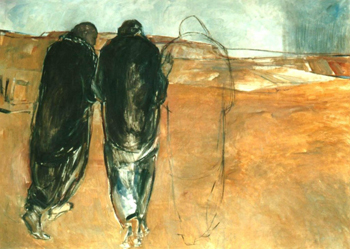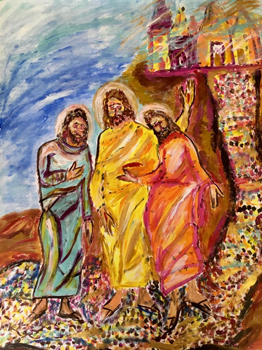For Sunday April 26, 2020
Lectionary Readings (Revised Common Lectionary, Year A)
Acts 2:14a, 36-41
Psalm 116:1-4, 12-19
1 Peter 1:17-23
Luke 24:13-35
On this third Sunday of Easter, we find ourselves traveling a road that’s uncomfortably familiar. Every one of us, regardless of identity or circumstance, knows this road. We’ve walked it. We’ve lost our way on it. We’ve left it behind and then returned to it. The road is the road to Emmaus, and we recognize it by the words we speak when our feet hit its rough and winding way one more time: “But we had hoped.”
But we had hoped the tumor wasn’t malignant. We had hoped our marriage would get easier. We had hoped our son would come home. We had hoped the depression would lift. We had hoped to keep our jobs. We had hoped to carry the baby to term. We had hoped the pandemic would spare our family. We had hoped for a peaceful death. We had hoped to experience God’s presence when we pray. We had hoped our faith would survive.
The words we speak on the road to Emmaus are words of pain, disappointment, bewilderment, and yearning. They are the words we say when we’ve come to the end of our hopes — when our expectations have been dashed, our cherished dreams are dead, and there’s nothing left to do but leave, defeated and done. But we had hoped.
In our Gospel story this week, Cleopas and his unnamed companion say these same words to the stranger who appears alongside them as they walk to Emmaus on Easter evening: “But we had hoped that he was the one to redeem Israel.”
Jesus — as far as they know — is dead. The Lord they staked their lives on, the Messiah they thought would change the world, has died the most humiliating and godless death imaginable, and his promises of a new kingdom have come to nothing. Worse, Jesus’s tomb is empty, his body is missing, and the women who loved and followed him appear to have gone mad, what with their bizarre reports of angels, gardeners, and talking ghosts. How completely things have fallen apart. “But we had hoped” for so much.
 |
It always startles me to remember that the Emmaus story is an Easter story. According to Luke’s Gospel, it happens on Resurrection Sunday. On the very day we pack our churches, flower our crosses, and sing our “Alleluias,” the road to Emmaus stretches out ahead of us, offering defeat, disillusionment, and misrecognition. Which is to say, sometimes resurrection takes longer than three days. Sometimes new life comes in fits and starts. Sometimes, seeing and recognizing the risen Christ is hard.
This year, as the Covid-19 crisis continues to wreak havoc around the world, I am grateful for the honest witness of this post-resurrection story. I’m grateful that the journey continues into Easter evening, when hope is possible but not yet realized. I’m grateful that even the road to Emmaus — the road of brokenness, the road of failure — is a sacred road. A road that Jesus walks. A road that honors our deep disappointment, even as it holds out possibilities of nourishment and revelation.
As I reflect on the Gospel for this week, what strikes me is how much the Emmaus narrative reveals about the heart and character of Jesus. Once again, I am reminded that Jesus is not who I think he is, and not who I necessarily want him to be. Who is the would-be stranger on the broken road? How does he respond when all appears lost? What does he do for the weary and the defeated? Here is what I notice:
I notice a quiet resurrection. One would think that a God who suffers a torturous and wholly unjust death would come back with a vengeance, determined to shout his triumph from the rooftops, and prove his accusers and killers wrong. But Jesus does no such thing. As far as we know, he doesn’t enter the Temple and make a scene. He doesn’t appear to the Sanhedrin, or show up at Pilate’s house, or set the sky ablaze with fireworks. He makes absolutely no effort to vindicate himself, or to avenge his cruel death.
Instead, on the evening of his greatest victory, the risen Christ takes a walk. He takes a leisurely walk on a quiet, out-of-the-way road. When he notices two of his followers walking ahead of him, he approaches them in a guise so gentle, so understated, and so mundane, they don’t recognize him.
 |
This is not, I’ll admit, what I always want from the resurrected Christ. “But we had hoped” he’d be more dramatic. More convincing. More unmistakably divine. We had hoped he’d make post-Easter faith easier. Part of the disappointment we face on the Emmaus road is the disappointment of the quiet resurrection. The disappointment of God’s maddening subtlety and hiddenness. The disappointment of a Jesus who prefers the quiet, hidden encounter to the theatrics we expect and crave.
I notice healing through story. As soon as Jesus falls into step with the companions on the road, he invites them to tell their story: “What are you discussing with each other while you walk along?” Astonished by the question, Cleopas and his co-traveler tell Jesus everything. They share with him the story of their faith — its rise and its fall. They tell Jesus how high their expectations had been for their now-crucified leader, “a prophet mighty in deed and word before God and all the people.” They describe their devastation at his death. Their confusion, their loss, their uncertainty. They tell Jesus the whole story.
And Jesus listens. He hears them out, allowing them the balm of articulation. And then — when they’re done — he tells the story back to them, and as he does so, the story changes. In his retelling, it becomes what it really always was — something far bigger, deeper, older, wiser, and richer than the travelers on the Emmaus road understood. “Here’s what you’re leaving out,” Jesus seems to say. “Here’s what you’re missing.”
When Jesus tells the story, he restores both its context and its glory. He grounds the story in memory, in tradition, in history, in Scripture. He helps the travelers comprehend their place in a narrative that long precedes them, a narrative big enough to hold their disappointment without being defeated by it. When Jesus tells the story, the death of the Messiah finds its place in a sweeping, cosmic arc of redemption, hope, and divine love that spans the centuries. When Jesus tells the story, the hearts of his listeners burn.
For me, the experience of the Emmaus road always involves a narrowing of my story. My lens becomes very small, very myopic. I lose all sense of the big picture. I lose all ability to place my life in the broader, more expansive context of God’s all-encompassing Story. Like Cleopas and his companion, I need Jesus to meet me on the road, and weave memory, Scripture, context, pattern, purpose, and history back into the tiny narratives I cling to. I need the Word — eternal and all-loving — to shape, hone, chasten, and enliven my words.
“But we had hoped the story was bigger. We had hoped it would have a better ending.” Well, it is. And it does.
 |
I notice the freedom to leave. When the travelers reach Emmaus, Jesus gives them the option to continue on without him. In fact, he makes as if he’s leaving, placing them in a position where they have to be absolutely intentional and definitive about their desire regarding him. Do they want him to stay? Are they willing to risk hosting a stranger in their home? Do they wish to go deeper with this man who makes their hearts burn, or are they content to leave the encounter where it stands, and return to their ordinary lives without learning more?
I always shudder a little bit when I get to this part of the story. What would have happened if Cleopas and his companion said goodbye to Jesus on the road? How would their story have ended if Jesus walked away? The companions would have missed so much. The Messiah they thought they knew and loved would have remained a stranger. They would not have experienced the intimate knowing of the broken bread, the shared cup. The joy of resurrection would not have become theirs.
I’m always surprised — and, I’ll admit, frustrated — by Jesus’s unwavering commitment to my freedom. He will not impose. He will not overpower. He will not coerce. He’ll make as if he’s moving on, giving me space, time, and freedom to decide what I really want. Do I desire to go deeper? Am I ready to get off the road of my failures and defeats? Am I willing to let the guest become my host? Do I really want to know who the stranger is?
“Stay with us.” That’s what Cleopas and his companion say to Jesus. Stay with us. An invitation. A welcome. The words a patient Jesus waits to hear.
I notice the smallness of things. Once Jesus and his companions are seated around the table, Jesus takes bread. He takes, blesses, breaks, and gives. So small a thing. So small a thing that changes everything.
During these hard days of sheltering in place, hearing horrific stories of death and suffering, and fearing for our futures as individuals, families, communities, and nations, it’s difficult to trust in the transformative power of small things. A bit of bread. A sip of wine. A common table. A shared meal.
But the Emmaus story speaks to this power — the power of the small and the commonplace to reveal the divine. God shows up during a quiet evening walk on a backwater road. God is made known around our dinner tables. God reveals God’s self when we take, bless, break, and give. God is present in the rhythms and rituals of our seemingly ordinary days.
What does this mean right now? It means God is in the text you send to the lonely neighbor you can’t visit during quarantine. God appears in the Zoom gathering, the livestream worship service, the phone call, the greeting card. Jesus is the stranger you see across the street when you walk your dog — both of you smiling beneath your protective masks. The sacred is in the conversation you have with your stir-crazy child, the technology you attempt to master so that you can talk to your friends across the distances, the loved one who challenges you to reframe the story of these days in the light of God's inexplicable provision and love. If the Emmaus story tells us anything, it tells us that the risen Christ is not confined in any way by the seeming smallness of our lives. Wherever and whenever we make room, Jesus comes.
“But we had hoped.” Yes, we had. Of course we had. So very many things are different right now than we had hoped they’d be. And yet. The stranger who is the Savior still meets us on the lonely road to Emmaus. The guest who becomes our host still nourishes us with Presence, Word, and Bread.
So keep walking. Keep telling the story. Keep honoring the stranger. Keep attending to your burning heart. Christ is risen. He is no less risen on the road to Emmaus than he is anywhere else. So look for him. Listen for him. And when he lingers at your door, honoring your freedom, but yearning to feed you, say what he longs to hear: Stay with me.
Debie Thomas: debie.thomas1@gmail.com
Image credits: (1) The Falls Church Anglican; (2) Anglican Parish of Aspley-Albany Creek, Queensland; and (3) Broken But Not Divided.



